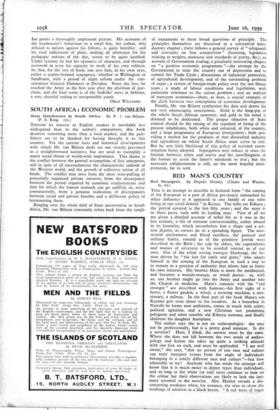SOUTH AFRICA : ECONOMIC PROBLEM
State Interference in South Africa. By F. J. van Biljoen. (P. S. King. x5s.)
THOUGH its interest to English readers is inevitably less widespread than to the author's compatriots, this book deserves something more than a local market, and the pub- lishers are to be thanked for having brought it to this country. For the current facts and historical developments with which Mr. van Biljoen deals are not merely presented as a straightforward narrative, but are used to exemplify a major social theme of world-wide importance. This theme is the conflict between the general assumptions of free enterprise, still in spite of all encroachments the characteristic outlook of the Western world, and the growth of collective action of all kinds. The conflict may arise from the mere wire-pulling of powerfully organised private interests, from the discrepancy between the period required by economic readjustments and that for which the human stomach can go unfilled, or, more constructively, from a genuine realisation of discrepancies between social and private benefits and a deliberate policy of harmonising them.
Ranging over the whole field of State intervention in South Africa, Mr. van Biljoen constantly refers back from the tangle
of enactments to these broad questions of principle. The principles themselves are discussed in a substantial intro- ductory chapter ; there follows a general survey of " safeguards and restraints on free competition " (licensing, legislation relating to weights, measures and standards of purity, &c.), an account of Government trading, a peculiarly interesting chapter on " a positive economic programme "—the attempt by the Government to steer the country out of depression and to control the Trade Cycle ; discussions of industrial protection, of agricultural development, and of the outstanding problem of sugar ; a review of foreign-trade policy over the last fifteen years ; a study of labour conditions and legislation, with particular reference to the colour problem ; and an analysis of transport economics—there, as here, a crucial example of the clash between two conceptions of economic development.
Finally, Mr. van Biljoen synthesises his data and draws his not very encouraging conclusions. Gold is the king-pin of the whole South African economy, and gold to his mind is doomed to be dethroned. The proper objective of State control should be the raising of the standard of living of the present inhabitants, both white and coloured, of the country, and a large programme of European immigration ; both pro- viding a market for the products of that diversified industry and agriculture on which South Africa must come to rely. But he sees little likelihood of this policy of national recon- struction being adopted. Segregation may reduce at once the friction between white and native and the unwillingness of the former to assist the latter's standards to rise ; but the necessary enlightenment is still, on' the most hopeful inter- pretation, far to seek.






















































 Previous page
Previous page